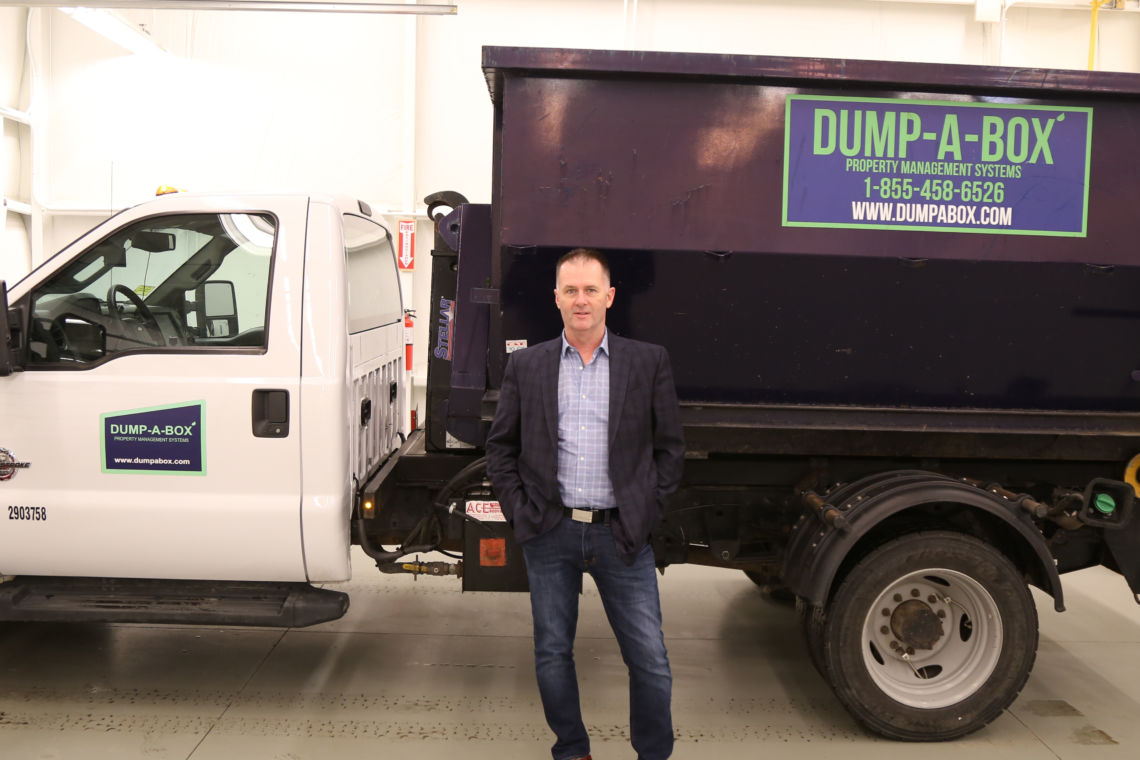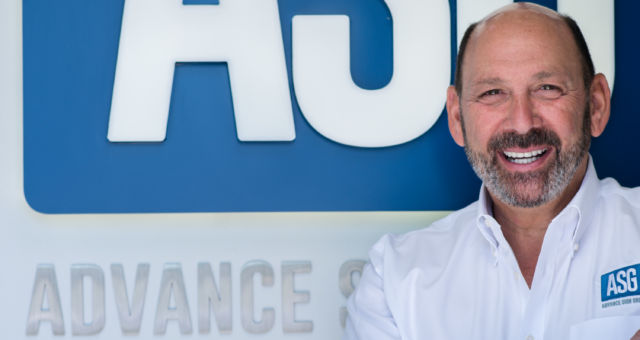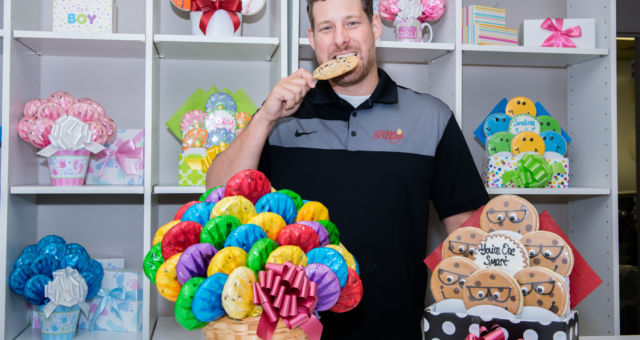What is your full name, title, and business name?
Randy K McDermott, Owner/President, The Robert Leo Group and “Dump-A-Box Dumpster Rentals”
Follow Dump a Box on Social: Facebook | Twitter
Give us a summary of your business in 200 words or less.
We specialize in smaller dumpster rentals (6 Cubic Yard to 25 Cubic Yard) providing services to homeowners, remodelers and contractors. While there are many businesses to choose from, we differentiate ourselves as being a better dumpster rental experience, we are transparent, friendly, professional and clean. We don’t want to be the biggest, we want to be the best.
How did the idea for your business come about?
I spent the better part of a decade working for the largest public waste hauler in North America and I was an investor in a waste hauler startup in Columbus. I saw a number of opportunities for niche plays within the industry. Industry leaders can’t capitalize on these opportunities because it is not part of their strategic plan and they are unable to sustain focused market by market plans that are scalable. At the same time, homeowners do not want dirty, oily and heavy commercial waste trucks on their driveways, but still desire a service that feels personalized and professional.
In addition, homeowners want to feel confident with service providers. We establish confidence with our customers by doing what we say we will do as along with billing transparency. We answer the phones and provide upfront quotes that outline the process from start to finish. Additionally, we leverage digital channels to allow customers to talk to us in ways that are meaningful to them.
What was the turning point for your business? Was there a moment you knew you had something special?
We knew from the start that we had something special because our model is based upon years of experience and customer feedback on what was missing in the waste service experience. Since selling our first dumpster, we have received great reviews and repeat customers. We have a strategy that will make us a preferred dumpster company locally and eventually take us to a national stage.
What steps did you take to begin your business after identifying several niches that had yet to be capitalized on?
After identifying niche plays, I developed a few hypotheses. In order to test my theories, I performed extensive market research that covered the waste industry, local demographics, market size. In addition, I researched my competitors extensively, down to company ownership and structure. I took my research information and built detailed operating models to simulate how the business would consume capital, deliver cash-flow, and grow.
What does it mean to you to be an entrepreneur and business owner?
For me, becoming an entrepreneur is an independent expression of freedom and creativity. It is the challenge for one person to take action on an idea and make it rain in their own world. While the risks are high, the personal rewards are great and lead to independence, security and a sense of personal accomplishment and purpose.
What does the city of Columbus mean to your business?
The City of Columbus is a great place to be, plain and simple, the people of Columbus are great. They want to see people succeed and they are willing to help them along the way. Our leaders are ensuring that the city continues to be a destination for new business and entrepreneurism which makes the city full of opportunity for a business such as ours.
Are you from Columbus? If not, please explain what brought you to here and ultimately what made you stay.
I grew up in the Pittsburgh and Cleveland areas as a child. After graduating from high school, I lived in the Detroit metropolitan area before deciding to move to Columbus in 1994. I was a mechanic by trade and wanted to get a college education, so I started attending classes at Columbus State and then Ohio Dominican University, where I earned my bachelors of business administration degree in 2000. From there I continued my education at Capital University where I earned my MBA in May of 2004. While attending Capital, I met my future wife, Kathy. We are now blessed with 3 young boys and have no plans of leaving Central Ohio. Central Ohio is our home.
What’s the number one piece of advice you’d give to anyone wanting to start a business?
Spend considerable time developing a market strategy, study your competition, craft detailed plans, timelines and models, budget twice as much as the math tells you.
What do you wish you knew about entrepreneurship before starting your business?
I wish I would have paid more attention and retained what I learned in Accounting 101 and 102 when I was in college. When you start a business, you learn the value of proper accounting more so than when you are sitting in the classroom.
What is one benefit you didn’t anticipate about being an entrepreneur? What is one stressor or drawback?
A benefit is the impact regarding accounting treatment of capital investments and the effect it has on total taxable income. A drawback is debt collection. While we have a low bad debt reserve, there are individuals and companies out there that just don’t pay their bills. Following-up is a pain, but we have learned to quickly move these people and companies into the hands of an aggressive debt collection agency. If we are able to collect it’s good, otherwise we are just leaving a mark on their reputation and credit.
What’s the most challenging part of your business (i.e, what keeps you up at night)?
Competing in the digital space with national (and even local) established competition. Just 25 years ago, you only had to have an ad in the phone book or in some mailer. Today, you have to juggle SEO placement using keywords, establish back-links, chase Google algorithms and have plenty of luck to ensure that your name appears at the top of the search engine results. Because most customers for waste disposal start at the top of the list and go down, it is critical that you understand your local digital market and how to stay aggressive without paying for worthless leads.
Every business owner has a flaw. What’s yours?
I plan hard and long and cause my own delays. This is an interesting question because what others may see as a flaw or “failure to launch” (it took me a long time to pull the trigger), I see as a strength. Because of this “flaw”, I did my homework, I anticipated what might happen, I had my plan and I executed it.
Why do you think most business owners fail? What has made you different?
I think business owners fail primarily because they have under-planned by underestimating everything and not developing contingency plans. The success of a my business is determined by doing a number of right things really well at the same time, there is no single activity that will deliver maximum success without all of the others in concert. I have carefully planned and modeled how my business would grow, what levers I will pull under certain circumstances, overestimated expenses and cash flow requirements and I stick to a written agenda. I also have the advantage of having deep experience in operations, P&L’s, business strategy and execution. Years ago, I started life out as a successful ASE Master Certified Technician, I have worked for 3 large companies and held roles at every level through Sr. Director. I also put myself through undergraduate school and graduate school, earning an MBA. I now work as a professional consultant in one of the largest consulting firms in the world.

It is a lifelong experience in several industries and in multiple leadership levels that I reflect upon when making decisions. I know what has worked and what hasn’t and why.
What was your biggest mistake and what did it cost you?
My biggest mistake has been extending lines of credit. While the losses are small compared to annual revenue, there are customers out there that haven’t paid their bill. There is only one thing worse than not having revenue, and that is having a customer that doesn’t pay their bill.
What tool has helped you the most for your business (invoicing, accounting, shipping, plugin for website, etc.)
Our proprietary work management software (WMS). We have configured our WMS to interface with our accounting, email and text. We have also recently built API capabilities with our vehicle GPS provider. We are on a mission to digitally connect our business with our clients and our customers love it.
When did you know it was time to expand your business, make your first hire, etc.?
I run the business based on a strategic plan. While timelines may change, the expansion triggers do not change. Expansion triggers are based on key operating indicators that are spelled out in the master business plan.
What is an example of a trigger that helped you know it was time to expand your business?
Triggers are predetermined operational and financial indicators that are outlined in the business plan and financial model that allow us to make informed and planned growth moves. For example, the decision to purchase our third truck was planned once our revenue run rate and units of activity per day maintained predetermined goals. The reason we built decision points into the business plan is we wanted to make it easier to grow without consternation or second guessing.
What is something that you did that was a game changer for your business?
I brought my wife into the business and she is energizing to everyone…While growth was strong before her involvement, it is even stronger since she has joined the team.
What was an idea that you spent a lot of time on or thought would make a big difference in your business that didn’t pan out?
We thought there would be value in enrolling in big name national online service lead companies and these companies are not customer-centric. In most cases, the sale was a race to the bottom regarding margin. We are not in the business of practicing for a fee. We have invested elsewhere and that is our own brand, the customer experience we provide and our digital footprint.
What is something that your business spends a lot of money on that’s worth it?
Competing in the digital marketplace and overall branding. What’s that saying, “Dress for the role you want to achieve?” Well, we dress for the role we want and the role we have: to be the best! Every day we have the opportunity to strive for excellence.
Who do you vent to when you have a business problem?
My wife, Kathy McDermott.
What other entrepreneur do you look up to most?
Dave Thomas (founder of Wendy’s): Dave Thomas started from very little and the legacy he has left behind continues to resonate today after his passing. Wendy’s follows 5 core values that are simple and meaningful for business and personal experience. They are as follows:
• Quality is Our Recipe
• Do the Right Thing
• Treat People with Respect
• Profit is not a Dirty Word
• Give Something Back
These aren’t hard concepts to grasp. They also keep you focused on the master plan. In addition to these values, Dave Thomas was just a nice guy and a hometown hero. Not many CEOs today can say the same thing.
If you had to tell a visitor one thing to do/see/eat in Columbus, what would it be?
I guess it depends on the season. We have a thriving food truck presence here in Columbus, so that is a must for sure. There are so many good places to eat, but to avoid national brands, I would recommend the Short North. We really like The Pearl (Cameron Mitchell). The North Market is also a place to go. If during football season, EVERYONE has to experience The Ohio State game day. Even if you aren’t a fan, it is an amazing experience to remember for a lifetime.





